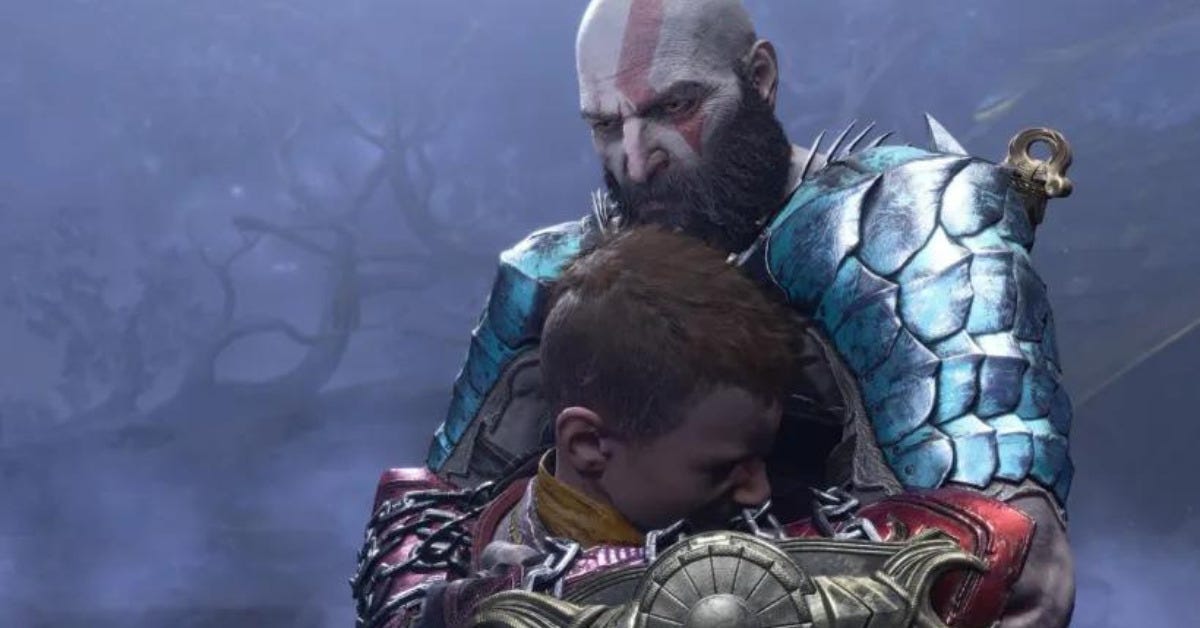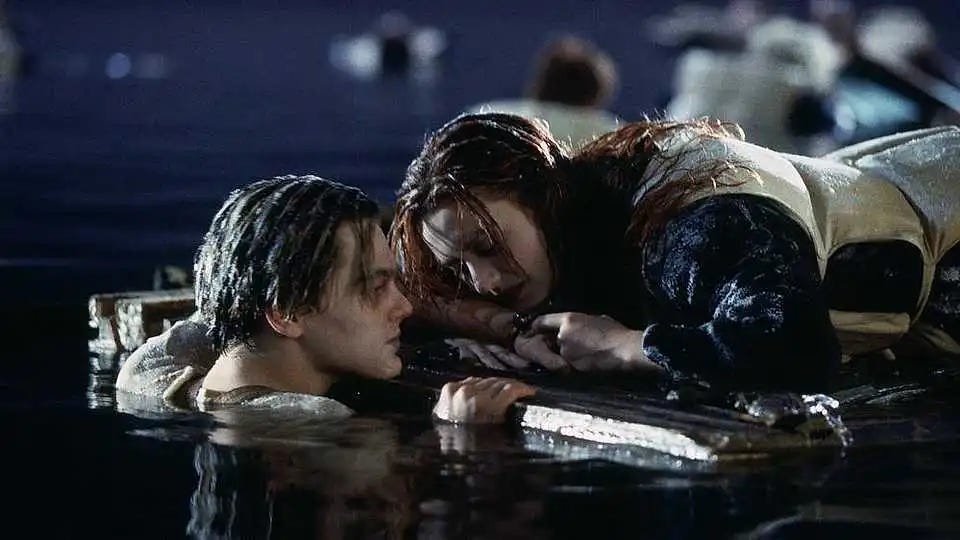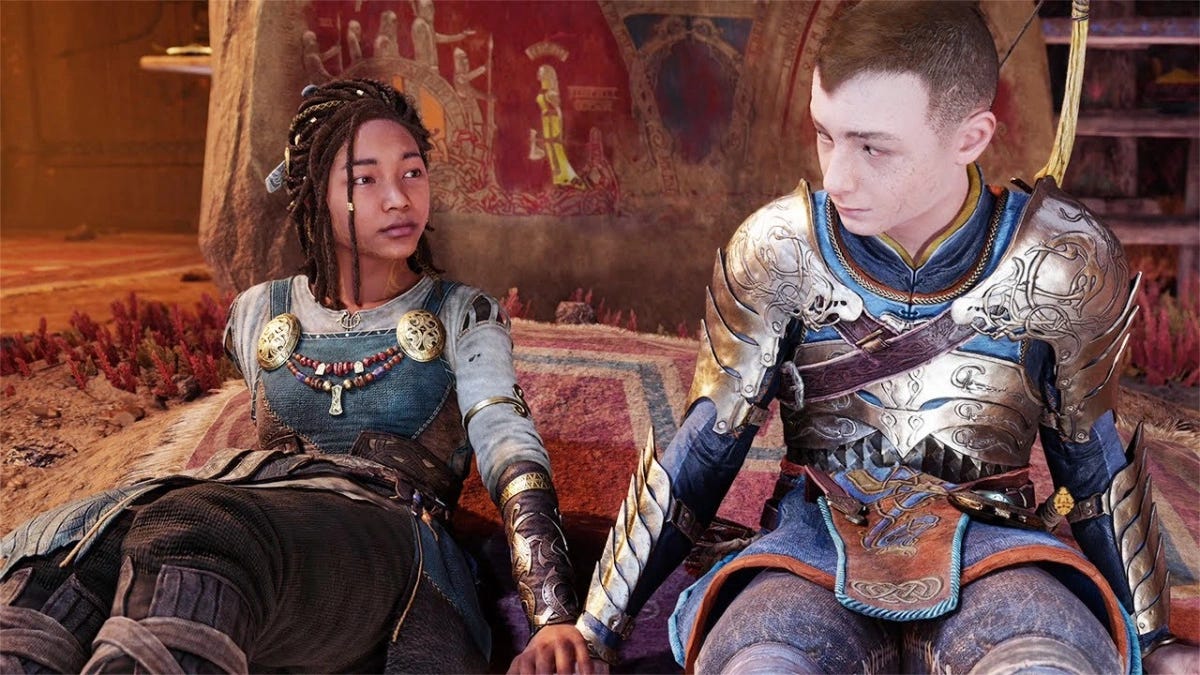God of War Ragnarok: Five Game Systems In One Bag
In which I call for designing less and arguing more.
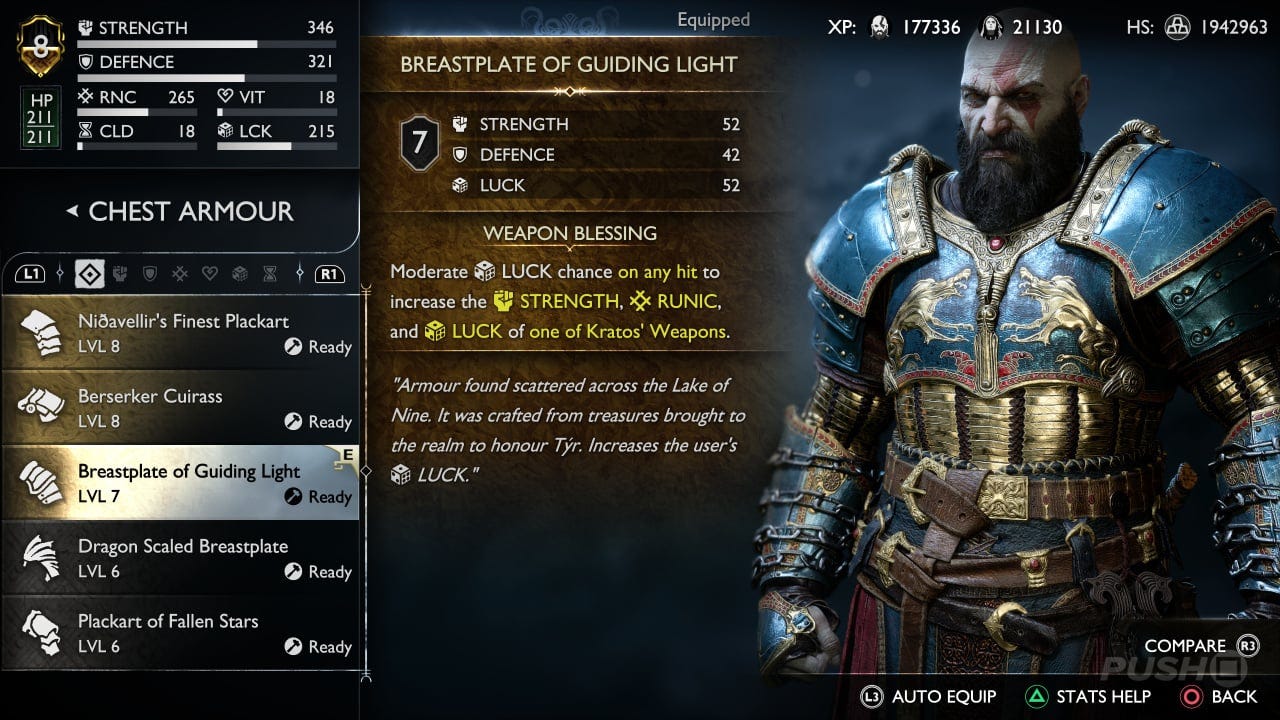
This item gives a chance to, with high Luck, get more Luck.
It took some doing, but I finished God of War Ragnarok. In my traditional way, I'm posting about it months after everyone forgot it existed.
It's an OK game. Flawed, but with a certain amount of fun in there. Its flaws are interesting flaws. I'm a nobody on the outside, looking at a giant development monolith and trying to figure out how this game could possibly have ended up where it did.
I don't want to write a review. I think a
very solid, fair review is here.
That frees me up to spend a few posts pointing out teachable moments in God of War Ragnarok. Places where things went wrong, so others can learn from it.
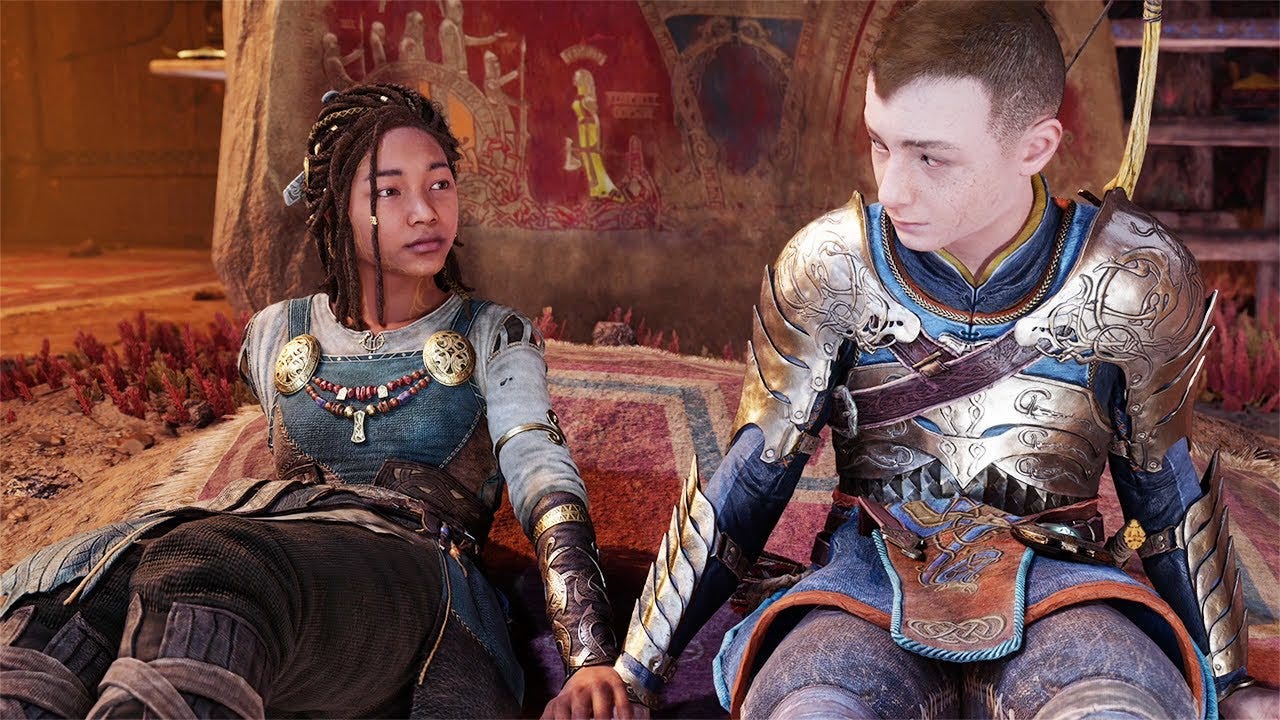
My favorite part was watching every girl find a way to tell Loki they just want to be friends. But in a, you know, Norse way.
Standard Disclaimer
This game is a huge success in every way, and I am an ant.
It got great reviews. (Though God help any foolish reviewer who tries to give an AAA game less than 9/10.) Sold a ton. Looking at the achievement percentages on my PS5, over 40% of players finished the game, which is a great rate.
So when I make my little criticisms, bear in mind I'm a crank. However, if you did play this game and find it was unsatisfying and you can’t quite articulate why, maybe I can help. It seems to be something
I do well lately.
My Grand Theory of God of War Ragnarok
This game was worked on by
a LOT of people. Including
seven people for "Player Investment Design", which is a new one on me.
But every element of God of War Ragnarok (GoWR from here on) feels like there was no debate about it, no second drafts. It feels like everyone went off into their own domain, made a bunch of stuff on their own, and it was all jammed together without some authority looking down at it and going, "Does this work?"
As a result, a lot of the design seems like it was put into the game to defend itself from the work of other developers. (Bear with me. I'll go into more detail on this in a future post, because I think it's really interesting. But if you are playing a game where every ledge you can jump to is marked with a big, bright yellow streak, you’ve experienced this.)
Games like this are a hugely collaborative process. There are lots of moving parts, and they all have to work together. At the same time, it's being made by artists, and artists tend to be passionate and opinionated.
When making a game like this, there should be lots of debate. Does this system work? Is that new mechanic fun? Is this character's dialogue working? Is this line funny? Does it make sense what we're trying to do?
These debates don't happen in big meetings, nor should they. They happen when someone plays something, doesn't like it, and asks someone about it in the hallway. "That fight really stomped me." "Do those runes actually do anything?" "Was that line meant to be a joke?"
Designers are sensitive and can generally pick up non-verbal cues. When I watch someone play one of my games, I can pick up when they switch from enchanted to annoyed.
It just feels like, for much of this game, these discussions and debates never happened, they got cut off at some point, and a bunch of random, incompatible parts got jammed together to make the game.
This is a weird, nebulous accusation, so I definitely need to give a concrete example.
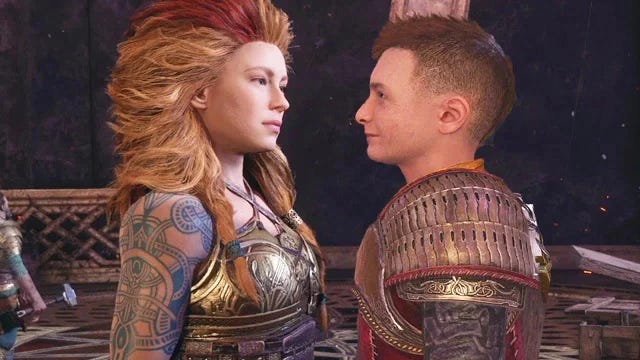
Loki in mythology is a master trickster, full of cunning, confidence, callousness, and charisma. I was really hoping to see this emerge in GoWR.
How God of War Gameplay Used To Work
Man, but I love God of War games. Have since their beginning.
Back In The Day (tm), God of War was pure, streamlined carnage. You had one weapon, with a slow and fast attack. By tapping different combinations of these, you could do some cool combos, but button mashing was generally adequate. There was also a rage bar, and when it filled up you could go crazy for a while.
This system was enough to carry three classics. (Also, there isn't much more to do in combat in Elden Ring, which is an absolute banger.)
How God of War Ragnarok Gameplay Works
OK, here's all the systems in GoWR. (Deep breath.)
Well, there's three weapons, each with its own combos. Each can be leveled up a number of times. Each weapon has several choices for an upgrade item, each of which has a special effect on a different attack you'll probably never use, each of which needs to be leveled up. Plus a shield (for blocking, parrying, and double-tapping stuns) and add-on upgrade for that. And each weapon has two different magic attacks, a big and small one, each of which can be leveled up to have different effects. Plus three different armor slots, each of which can be leveled up and has different effects. These add varying amounts to your six statistics. And there's still a rage bar, but you can choose from three abilities for that, each of which can be leveled up. Plus a runic (bonus magic) ability to choose and level up. And don't forget your amulet, which can be slotted with TEN (!) different upgrade stones.
All of this is to support your moveset. Because each of your three weapons has a slow attack, a fast attack, a running slow attack, a running fast attack, a way to charge it up when you have time to pause in combat (you won't), a way to attack after using one of the games TWO WAYS TO DODGE and TWO WAYS TO BLOCK, a way to charge up the weapon with repeated attacks, some missile options, new combos to memorize, a way to do extra attacks by just holding down the attack button which never works because the enemy will just hit you and break it, and, for the axe, a way to do attacks by switching stances. (There are stances?) You get these by sorting through three different skill trees. Also, use the attacks a bunch of times because you can then upgrade them.
And that's just you. You also have two companions.
This means two companion skill trees, each with their own attacks and abilities. Plus several choices of a creature to summon and level up. And ways to improve your two arrow types. Plus three stones to equip and level up to add tiny improvements to these arrows. (You'll need to remember the differences between sigil, runic, and sonic arrows.) You can also have your companion shoot your target when in combat (which means spamming the Square button whenever you get a spare moment).
THERE ARE FOUR WAYS TO DODGE AND BLOCK.
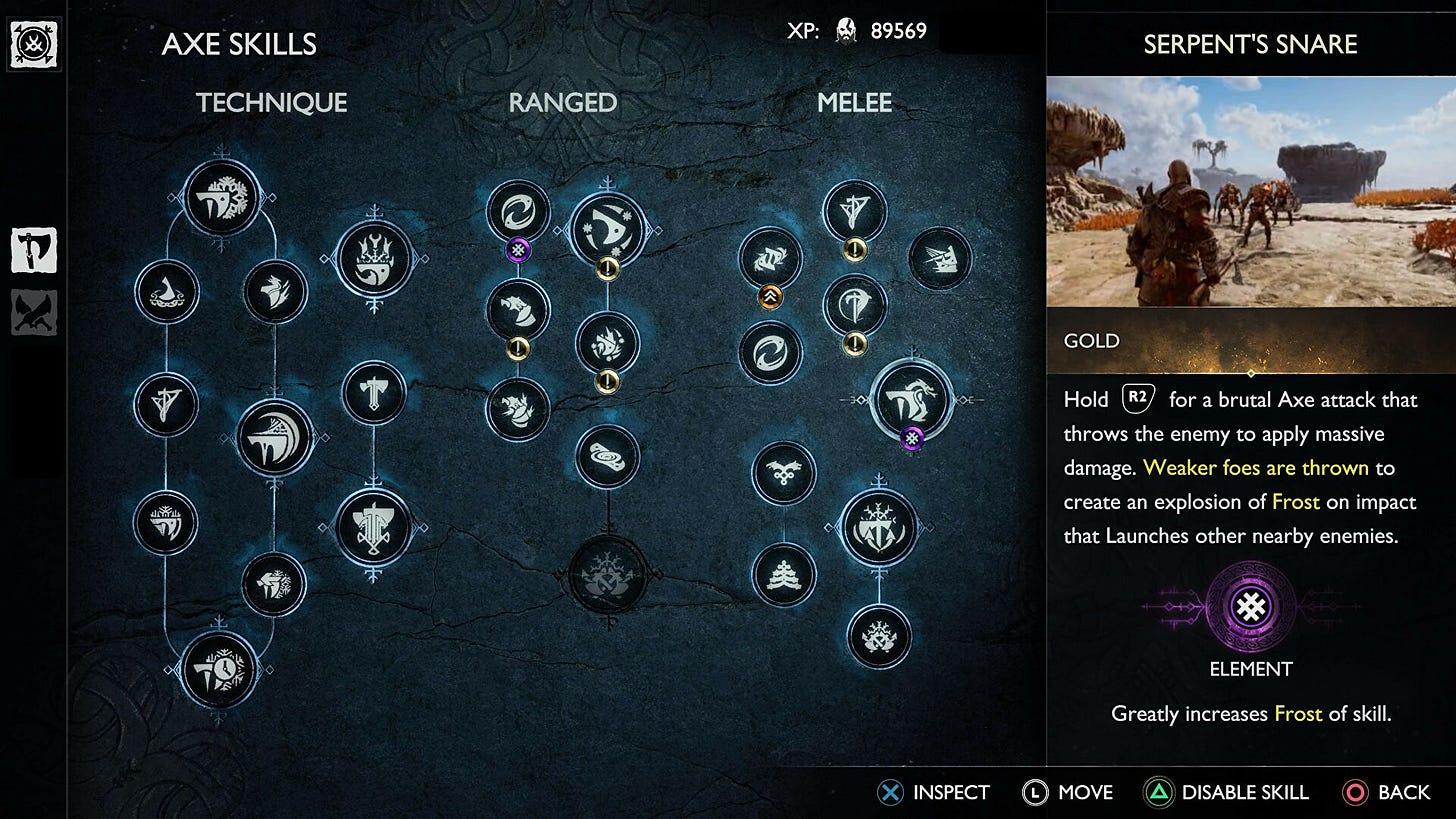
Strategy tip: If it’s a passive ability, buy it. If it requires you to take time in combat to activate it, rest assured the bosses are too fast to give you time.
Did You Read All That?
I hope you didn't. It's too much. Way too much for a fun, stabby carnage game.
I understand now why this game had seven Player Investment Designers. They all went off into the wilderness and designed a game. Then they got together and combined all their systems into one behemoth. The words "maybe not" were never spoken.
I Had To Make Sure I'm Not An Idiot
There are just so many options and combos. Like, your fire blades let you mash a button to make fire stronger. I found this really hard because combat is really fast and there just wasn't time to stand there and mash the buttons. (Oh, and mashing buttons is NEVER fun, and GoWR makes you do it a lot.)
Since I wasn't using any of this banquet of abilities, I thought, "Am I just an untactical dummy?" Constantly being afraid you’re screwing up and missing out on the good stuff doesn’t make you
feel powerful.
So I went onto Twitch and YouTube and watched how Serious Gamerz did the hard fights.
Turns out, yep, most of the abilities aren't really there for anything but making the skill tree look big and puffy. Good players dodged, used shield parries, and hit with the nice, bread and butter quick attacks. The fights were just too fast and chaotic for anything else, especially against the tough bosses.
They used the summons and magic abilities, sure, but they tended to just wait until a good moment and dump all of them as fast as possible. Then they went back to standard tactics and concentrating on the fight.
In other words, to play the game when it gets tough, you just have to play it as if it was old God of War. Most of the new stuff could be lost and it wouldn't change a thing about how players interact with the game.
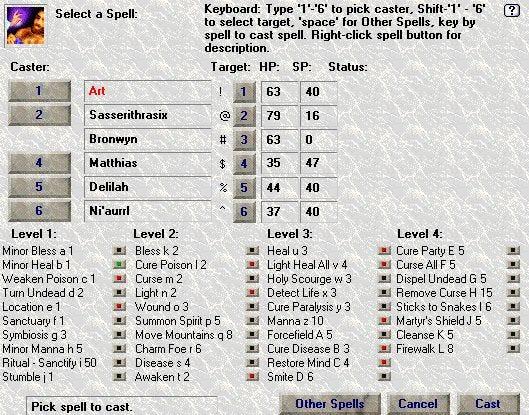
I wrote a game called Exile 3: Ruined World with over 100 spells. It was a huge success. Maybe I was dumb to change anything.
But What About Different Builds?
The ideal for a system like this is to encourage players to have and switch between different builds and strategies. Perhaps in some battles you rely on your weapon powers, while in some fights you turtle up behind your shield. Different items could support these strategies.
Two problems with this.
First, every single thing in this game, every item, every ability, has to be leveled up, and it's expensive. In the late game, when things get tough, there's just no way to easily experiment with different strategies. Nobody wants to farm for an hour to see if this fast axe attack or that belt buckle is worthwhile.
Second, the item special abilities are too finicky and over-designed. They are all, "Gives a little more to this less-important stat and also gives a slight chance of something nice happening when you use this ability you never use."
I found a belt that gave a bonus to healing and I just used that for the whole game. It gave a clean, simple bonus, which was all I wanted.
So if I had to make suggestions, the ways items help you need to be clear, substantive, and help a specific strategy. Buying upgrades has to happen in a way that doesn't lock you into a gear set at high level. (One possibility: When you level your belt to 5, it levels all belts to 5.) And cut the number of systems by half. Like, those little stones you give your companions to make their arrows better? Completely unnecessary.
Why is there two ways to shield block? One of them is the really hard to time parry, and the other is a double bumper button tap (!?) in response to a really bright, obvious screen prompt. Why not just have shield parries, but be the first game ever to give a clear indication of when they can be used?
The best thing they could have done is have the Player Investment Designers watch people play the game for long stretches. Any ability or game element that players usually miss or mostly ignore? Cut it.
(Side note: There is a new game called Brotato, one of those single-stick shooters that are hot now. During a run of that, you are constantly buying small upgrades. These are perfectly balanced. Each gives a small improvement, and yet you can always feel it. If you're interested in systems design, it's a very interesting title.)
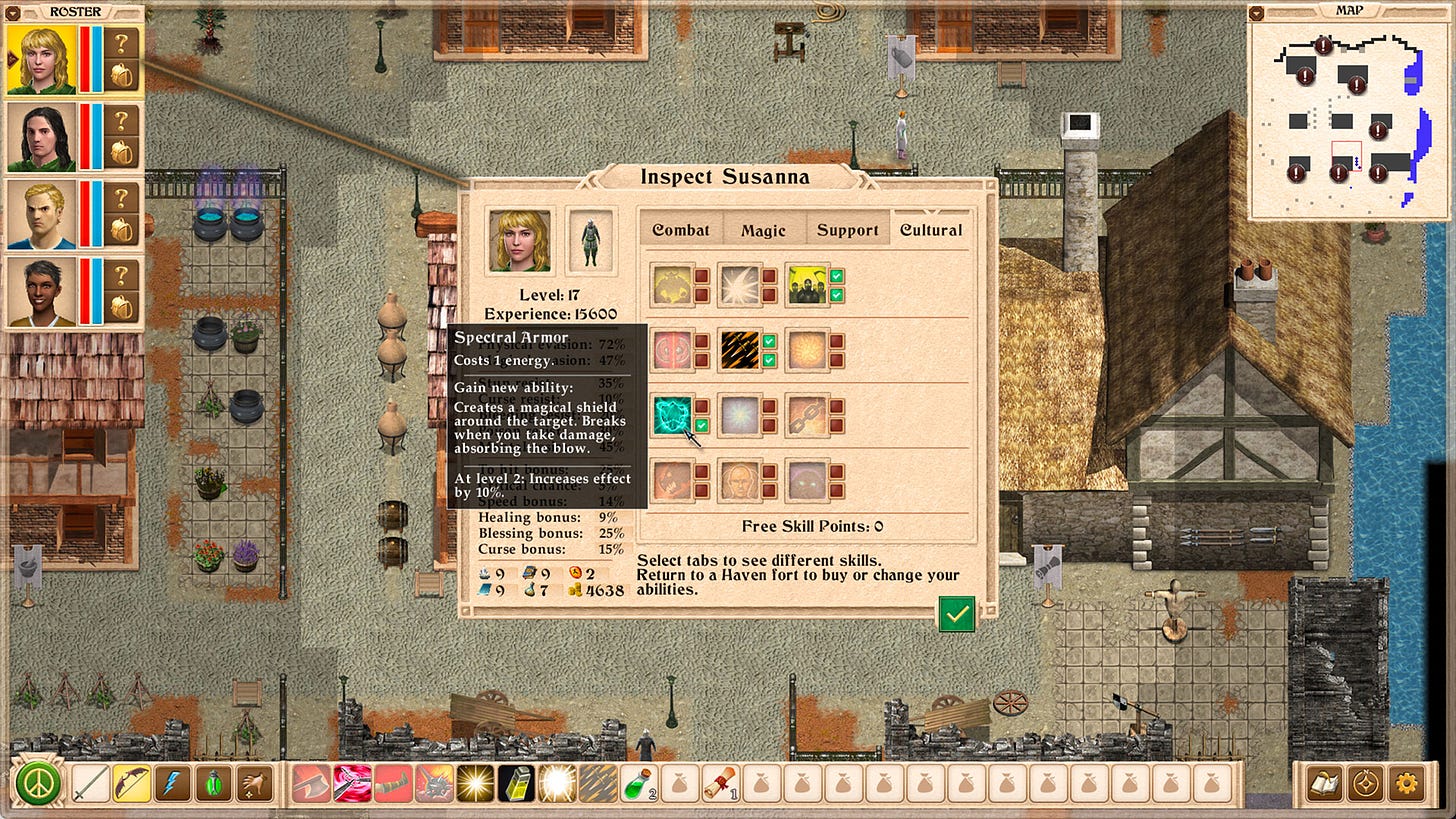
My latest
all-new game only had 57 skills, but all of them were useful sometimes. Very few people liked this game. Maybe, in 30 years in the business, I learned precisely zero.
But Credit Where Credit Is Due
You should always watch people play your game whenever possible. This will teach you more than anything else about what works and what doesn't.
For example, the spear they added is not particularly exciting in melee. However, you can throw spears into far off enemies and detonate them, and that is a lot of fun. The little booms bounce small enemies around. It’s hilarious. Big ups to whoever came up with that part. It's great.
Along these lines, the optional areas of the game are great. When you're in the jungle zone and you get a quest to follow a dog, be SURE to do this.
Doggo leads to an enormous, entirely optional area with tons of creative fights, fun puzzles, and neat stuff to do. I spent hours there. It was the only place where the game just took a breath and relaxed and laid off the emo drama and let me play God of War. The banter between the characters even became funny!
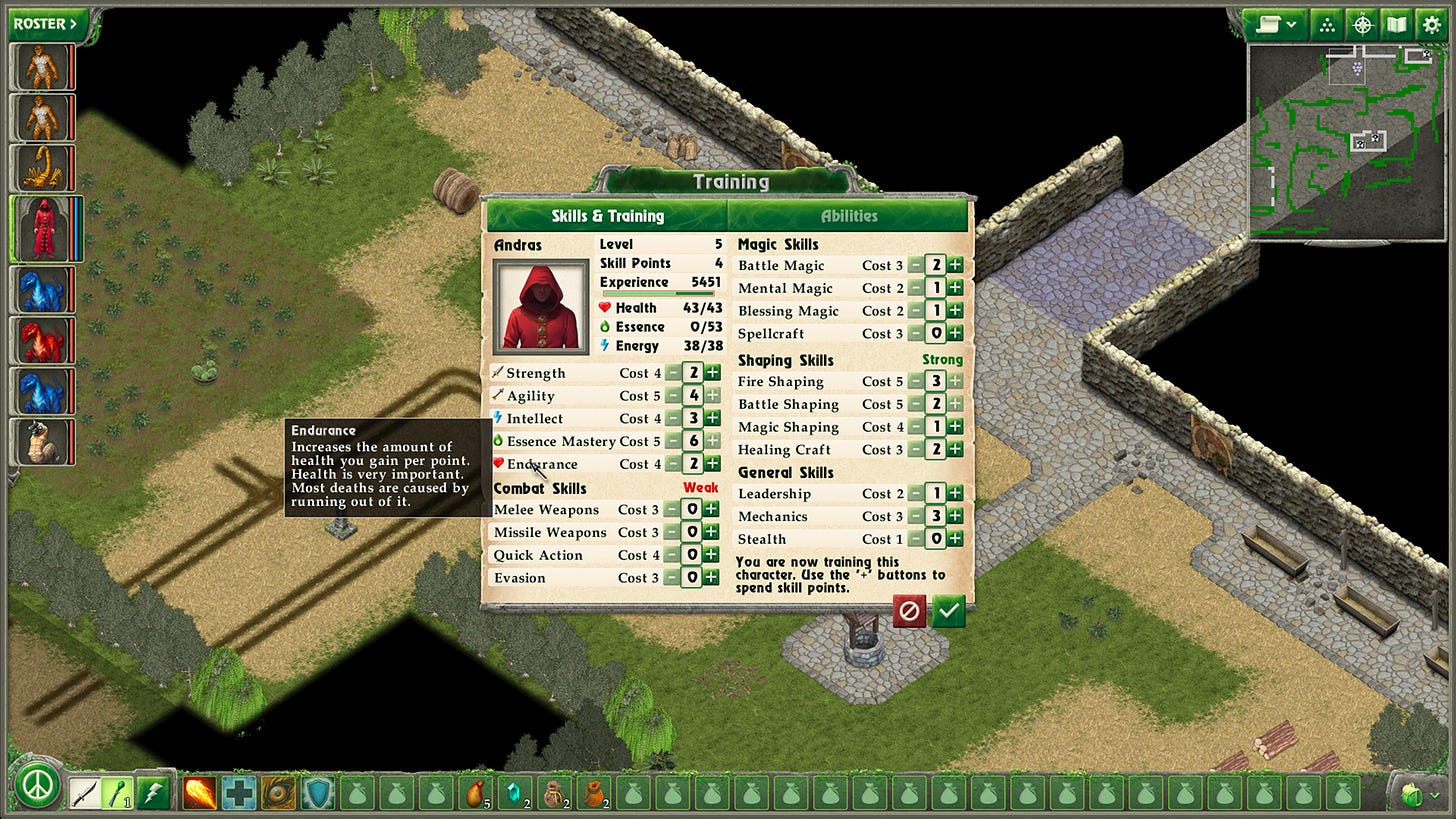
For our
Geneforge series, I’m starting with the old number of abilities and spells and then adding more. Then buffing each one until it’s useful sometimes. Yet, at its peak, it will still only have a fraction of the stuff GoWR has.
However, My Aesthetic Is Out of Date
The suggestion to pare down a game system always makes some players angry. There is a certain aesthetic that wants as much stuff loaded into a game as possible, whether it serves a purpose or not. Lots of people like that. Which is fine. People like what they like.
As I grow older, I find I want to strip the unnecessary out of my game designs. The Barter skill in RPGs is always useless, and I don't put one in. I want every rule and ability in every one of my games to have a good use somewhere. If it doesn't have one, I want it out.
My games used to have HUGE spell lists, but most of the spells had little value. This drives me crazy, so I cut down the number of spells in the remasters. I still angry complaints about this choice.
Now, when I remaster an old game, I've learned to be very careful with what I remove. Players still like lots of choices and options. (
Kickstarter for our new remaster going now!)
This is one area where I'm definitely out of touch and need to be very careful when designing new games. My Queen's Wish games got a lot of criticism for their stripped-down nature, but I enjoy playing them. Maybe it's me who is wrong.
All that being said, GoWR just has too much stuff. There are so many options it's too hard to find the fun options and the fun strategies. Cutting the choices by half, giving more freedom to explore them, and enabling substantively different builds would have made a better game.
That's It For Game Balance
Next time, I'll go into the story. The previous God of War had really sharp writing and a really good setup for the overall story. GoWR is a much more complicated situation.











![Glory to Codexia! [2012] Codex 2012](/forums/smiles/campaign_tags/campaign_slushfund2012.png)
![Have Many Potato [2013] Codex 2013](/forums/smiles/campaign_tags/campaign_potato2013.png)
![The Year of Incline [2014] Codex 2014](/forums/smiles/campaign_tags/campaign_incline2014.png)

























